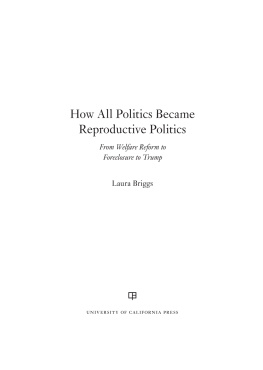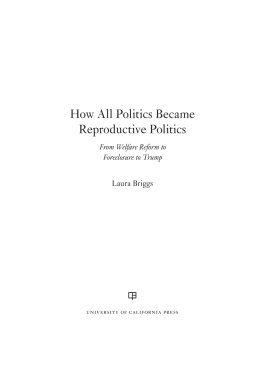Laura Briggs - How All Politics Became Reproductive Politics
Here you can read online Laura Briggs - How All Politics Became Reproductive Politics full text of the book (entire story) in english for free. Download pdf and epub, get meaning, cover and reviews about this ebook. publisher: University of California Press, genre: Politics. Description of the work, (preface) as well as reviews are available. Best literature library LitArk.com created for fans of good reading and offers a wide selection of genres:
Romance novel
Science fiction
Adventure
Detective
Science
History
Home and family
Prose
Art
Politics
Computer
Non-fiction
Religion
Business
Children
Humor
Choose a favorite category and find really read worthwhile books. Enjoy immersion in the world of imagination, feel the emotions of the characters or learn something new for yourself, make an fascinating discovery.
- Book:How All Politics Became Reproductive Politics
- Author:
- Publisher:University of California Press
- Genre:
- Rating:3 / 5
- Favourites:Add to favourites
- Your mark:
- 60
- 1
- 2
- 3
- 4
- 5
How All Politics Became Reproductive Politics: summary, description and annotation
We offer to read an annotation, description, summary or preface (depends on what the author of the book "How All Politics Became Reproductive Politics" wrote himself). If you haven't found the necessary information about the book — write in the comments, we will try to find it.
Laura Briggs: author's other books
Who wrote How All Politics Became Reproductive Politics? Find out the surname, the name of the author of the book and a list of all author's works by series.
How All Politics Became Reproductive Politics — read online for free the complete book (whole text) full work
Below is the text of the book, divided by pages. System saving the place of the last page read, allows you to conveniently read the book "How All Politics Became Reproductive Politics" online for free, without having to search again every time where you left off. Put a bookmark, and you can go to the page where you finished reading at any time.
Font size:
Interval:
Bookmark:

Edited by Rickie Solinger, Khiara M. Bridges, Zakiya Luna, and Ruby Tapia
Reproductive Justice: An Introduction, by Loretta J. Ross and Rickie Solinger
How All Politics Became Reproductive Politics: From Welfare Reform to Foreclosure to Trump, by Laura Briggs
Laura Briggs

UNIVERSITY OF CALIFORNIA PRESS
University of California Press, one of the most distinguished university presses in the United States, enriches lives around the world by advancing scholarship in the humanities, social sciences, and natural sciences. Its activities are supported by the UC Press Foundation and by philanthropic contributions from individuals and institutions. For more information, visit www.ucpress.edu.
University of California Press
Oakland, California
2017 by The Regents of the University of California
Library of Congress Cataloging-in-Publication Data
Names: Briggs, Laura, 1964 author.
Title: How all politics became reproductive politics : from welfare reform to foreclosure to Trump / Laura Briggs.
Description: Oakland, California : University of California Press, [2017] | Series: Reproductive justice : a new vision for the twenty-first century ; 2 | Includes bibliographical references and index. |
Identifiers: LCCN 2017007025 (print) | LCCN 2017014266 (ebook) | ISBN 9780520957725 (Epub) | ISBN 9780520281912 (cloth : alk. paper)
Subjects: LCSH : Reproductive rightsUnited StatesHistory. | Human reproductionPolitical aspectsUnited States.
Classification: LCC HQ 766.5. U 5 (ebook) | LCC HQ 766.5. U 5 B 73 2017 (print) | DDC 612.6dc23
LC record available at https://lccn.loc.gov/2017007025
Manufactured in the United States of America
25 24 23 22 21 20 19 18 17
10 9 8 7 6 5 4 3 2 1
For Jackson
This book emerged out of many conversations, including ones on playgrounds and in doctors offices, with family and friends. It particularly came from conversations with students in my Politics of Reproduction course at the University of Massachusetts Amherst, who have been invaluable in helping me think through the arguments of this book. They have been every professors dream studentsthoughtful, committed, and curious in ways that have pushed me and taught me. Their research has inspired my own, and our work together is truly represented on every page. I have been exceedingly lucky in my colleagues as well; the scholars and faculty associated with the Five College Reproductive Rights, Health, and Justice Certificate provided an intellectual community that made it possible to conceive and to write this book. If it makes any sense at all, its because of that smart group of faculty. The book also received a remarkable amount of help from a Facebook community, for which I am quite grateful, particularly since such support was so unlooked for.
I am also indebted to those who read one of the many versions of the manuscript (and some who read two or more), including Dna-ain Davis, Alexandra Stern, Lynn Morgan, Doug Hornstein, Rickie Solinger, Mimi Petro, Angie Willey, and students in WGSS 187, Gender, Sexuality, and Culture. Niels Hooper of University of California Press first persuaded me that there was a book here, one day over many drinks in Puerto Rico. He offered friendship, encouragement, and support in the much-longer-than-expected process of getting this book written. Martha Balaguera was an ideal reader and a brilliant research assistant, who performed heroics with footnotes at the very last minute. Zaynah Shaikh also provided help with research.
Audiences at the National Womens Studies Association, the American Studies Association, Radcliffe Institute, the Boston Seminar on Women and Gender, Vermont Law School, and Yale University offered smart commentary that made this a better book.
I wrote this while being the chair of the Women, Gender, Sexuality Studies Department at UMass Amherst, which meant that everyone I worked with had to live with this book, including my Friday disappearing act and other moments of absence (physical and mental). Ive been incredibly fortunate to have colleagues who not only put up with it but actively supported the thinking that produced this book, all brilliant intellectuals in their own right: Banu Subramaniam, Miliann Kang, Svati Shah, Angie Willey, Abbie Boggs, Jacqueline Luce, Lezlie Frye, Alexandra Deschamps, Tanisha Ford, Kirsten Leng, Mecca Jamilah Sullivan, and Kiran Asher, as well as Linda Hillenbrand and Karen Lederer, who kept everything going.
This is a book about households and reproductive labor, and my own nurtured and inspired this book. I am endlessly indebted to my partner, Jennifer Nye, who was the intellectual companion for so much of this book; our work together to figure out reproductive labor and the public policy that surrounds it was both theoretical and practical, from yelling at the newspaper to juggling our own crises of work and home. Jackson has lived with this book nearly his entire six years of life, and has felt the sacrifices it demanded of him acutely in every marble run I didnt help build, even as his invitations to play hooky from it inspired dance parties and window box gardens. Its ruined him permanently, though, as he has started writing books of his own. This book also had nonhuman companions: Toby the dog, who positioned himself under my desk for nearly every minute of its writing, and Ramona, a cat, who sat on my head when she could. Our other resident feline, Sophie, cared not one whit about this book or my labors, feeling that such things were not the affair of cats. I couldnt have done it without all of them.
Let me begin with a story. I am in the waiting room at the pediatricians office with my kid for a routine checkup, helping him with a learn-to-read app on the iPad and feeling frustrated that the doctor is taking so long, because I need to go to work. Every minute spent here tacks time on to how long I will have to stay when I finally get back to my desk. I look around the packed room at people waiting in line with camp physical forms; a dad helping a ten-year-old with her school project on a laptop; two immigrant moms addressing their kids alternately in English and a second language, one in Spanish, the other in Arabic. In an alcove partly separated from the main room, I see a sick kid leaning on her mom and reading Diary of a Wimpy Kid, while next to me, a heavily tattooed young couple is hovering nervously over their few-weeks-old baby.
Maybe because my paid job involves teaching and I am helping my little one learn, suddenly the carefully cultivated separation between working and not-working slips for me. I am doing work right now, and so are all these other people. I look around again, noticing how some of us are intensively engaged in cultivating access to
In calling this work reproductive labor, Franklin is drawing on a long intellectual tradition in feminism and on the left. Reproductive labor is the work necessary to the reproduction of human lifenot only having and raising children but also feeding people; caring for the sick, the elderly, and those who cannot work; creating safety and shelter; building community and kin relationships; and attending to peoples psychic and spiritual well-being. Most reproductive labor is done by people understood to be women, and because it is historically unpaid workcritical to the production and maintenance of a labor force but outside the formal system of work, wages, and productionwe often think of it as belonging to a private spherethe opposite of the public, where politics and economics live.
Font size:
Interval:
Bookmark:
Similar books «How All Politics Became Reproductive Politics»
Look at similar books to How All Politics Became Reproductive Politics. We have selected literature similar in name and meaning in the hope of providing readers with more options to find new, interesting, not yet read works.
Discussion, reviews of the book How All Politics Became Reproductive Politics and just readers' own opinions. Leave your comments, write what you think about the work, its meaning or the main characters. Specify what exactly you liked and what you didn't like, and why you think so.








